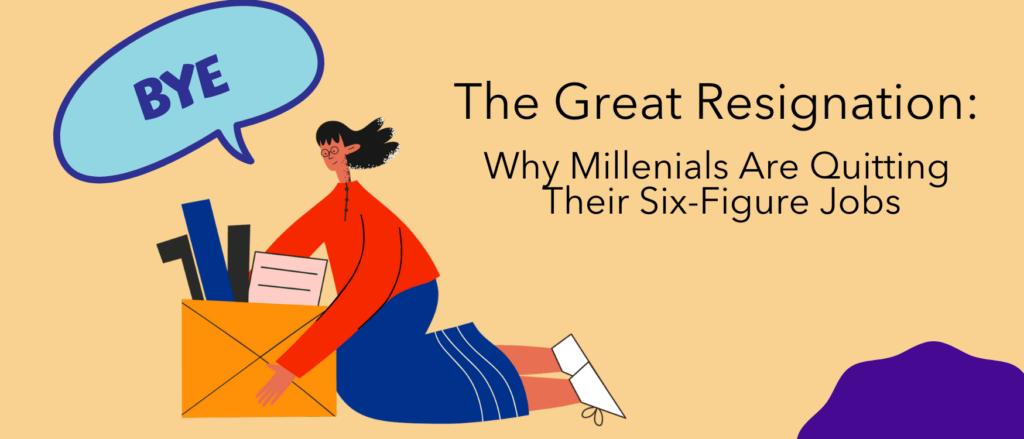The Great Resignation: Why Millennials Are Quitting Their Six-Figure Jobs

There’s a new trend on the rise, and it goes by the name of “the great resignation.” What is this, you ask? It’s simply when millennials quit their six-figure jobs in droves. Why are they doing this? Many say they’re burnt out, exhausted from working long hours for little reward, and this is not exactly about a monetary reward!
Others cite a lack of purpose or meaning in their work as the reason for their departure. Whatever the reason, one thing is clear: quitting your six-figure job is no longer taboo. In fact, if you ask a millennial he or she might just say quitting your job is the smartest thing you ever do. Find out why here!

Surely you have heard all these terms referring to specific generation-based groups, Gen-Z this, Baby Boomers that! They are everywhere; even products and services marketing are focused on accurately knowing the characteristics of each generation to have successful launchings.
One of the most famous are the millennials, a group that seems to have opened some portal to this new technological world. Not in vain, demographer William Frey calls them: “The Demographic Bridge to America’s Diverse Future”
Let’s get to know them!
Who Is A Millennial?
The term “Millennial” is typically used to refer to people born between 1981 and 1995. This generation is also sometimes known as Generation Y, because it follows Generation X.
This puts the youngest millennial at 25 years old and the oldest at 41. That’s a pretty wide range, which means that there is a lot of diversity within the millennial generation. But despite their different backgrounds, there are some commonalities that all millennials share.
Millennials are often described as confident, independent, and achievement-oriented people. They are also said to be more socially and environmentally conscious than previous generations. In addition, Millennials are the first generation to come of age in the new millennium, and they are often considered to be the most technologically savvy generation.
Claire Raines calls Millennials “the hottest commodity in the job market”
As a result, they have had a significant impact on the world of business and marketing. Companies that want to appeal to Millennials need to understand their values and preferences. For example, Millennials are more likely than other generations to make purchase decisions based on social responsibility
Millennials In The Workplace
As the millennial generation enters the workforce, employers are faced with the challenge of accommodating a group of employees with different values and expectations.
The millennial generation is often spoken about in the media, and there are a lot of stereotypes out there about them. However, millennials are quickly making their mark in the workplace and are proving to be a valuable asset to businesses. They are comfortable with change and adapt quickly to new situations, which is a valuable skill in today’s ever-changing business landscape.
In addition, millennials tend to be highly tech-savvy and have a strong understanding of social media and its power to reach audiences. This can be a valuable tool for businesses that want to connect with millennial consumers.
Finally, millennials are known for being highly engaged and motivated employees. They are eager to learn and make a difference in their workplace.
But, if millennials are “highly engaged employees”, why is this generation changing jobs as if they were changing socks?
Get more out of your business
Get the best employee engagement content every week via mailing list
What Is The Great Resignation?
Millennials are the material and intellectual authors of this breakpoint in job history: The Great Resignation. And since this generation is known for being highly educated and ambitious, it’s no surprise that they’re the ones driving this new trend.
The Great Resignation is a term that has been used to describe the millennial generation’s tendency to change jobs frequently. According to a recent study, the average millennial will hold 15 or 16 different jobs during his or her career. This is in contrast to previous generations, who tended to stay with the same company for their entire careers.
There are several factors that have contributed to the Great Resignation, including the growth of the gig economy and the increase in student debt.
Millennials also often place a greater emphasis on work-life balance than their predecessors. According to Gallup, 6 out 10 millennials (57%) answered that work-life balance and well-being in a job are “very important” to them. As a result, they are more likely to leave a job as it doesn’t meet their needs in terms of salary, benefits, or workplace culture.
Let’s dig deeper into these reasons!
Why Are Millennials Quitting Their Six-Figure Jobs?
There are many reasons why millennials are choosing to quit their six-figure jobs. For some, it’s simply a matter of burnout; for others it is about finding a job with better workplace culture. Whatever the reason may be, one thing is clear: quitting your six-figure job is no longer taboo.
Burn Out
Burnout is a major problem for millennials in the workforce. In fact, it’s one of the leading reasons why millennials are quitting their six-figure jobs. According to Deloitte, in comparison to 77% of all respondents, 84% of millennials claim they have experienced burnout at their present employment.
Also, in comparison to 42% of all respondents, over half of millennials claim they had quit a job because they were burned out. On the other hand, according to Indeed Jobs, in the pre-COVID life, 53% of millennials were already burned out, and they continue to be the most impacted group today with a bulk number of 59%.
The demands of the modern workplace are taking a toll on millennials. They’re working long hours, taking on extra assignments, and struggling to find a work/life balance. As a result, they’re burning out at an unprecedented rate. And, it’s having a major impact on the workforce’s well-being.
Workplace Culture
Millennials have high expectations when it comes to their work environment. They want to feel like they’re part of a team and that their work is meaningful. When they don’t feel like they fit into the workplace culture, they’re quick to look for a new job.
According to the study, millennials are three times more likely than older workers to leave a job because they don’t feel like they fit in. In addition, millennials are also more likely to switch jobs in search of a better culture fit.
This suggests that millennials place a high value on workplace culture and are willing to make sacrifices in other areas to find a job that aligns with their values. This is a major shift from previous generations, who were more likely to prioritize salary and benefits over company culture.
Lack of Meaningful Feedback
One of the main reasons millennials are quitting their six-figure jobs is because they’re not getting the feedback they need to feel engaged in their work. According to Gallup data, only 19% of millennials strongly agree they get routine feedback at work.
This yearning for feedback stems from the fact that millennials are used to receiving constant feedback in other areas of their lives. For example, thanks to social media, they’re used to getting immediate feedback on the photos and videos they post.
However, in the workplace, this isn’t always the case. In many cases, employees only receive performance reviews once or twice a year. This can leave millennials feeling disconnected from their work and like their efforts are not being noticed.
For millennials is not only about feedback, but about a meaningful review!
Zero Opportunities To Grow
In the past, employees would stay with the same company for their entire careers. But, millennials aren’t willing to do this. Millennials want positions that will help them grow both professionally and personally.
According to Gallup, a total of 87% of millennials rate “professional or career development opportunities” as very important for them in a job. This suggests that millennials place a high value on professional development and are always looking for ways to improve their skillset.
For most, this can seem a bit entitled and unrealistic, but the truth is that millennials have seen firsthand how quickly companies can downsize and how difficult it can be to find new jobs. As a result, they are less willing to stay at a company where they don’t feel they can advance.
Rigid Work Schedule
A traditional work schedule is no longer appealing to millennials. They want the freedom to create their own schedules and the flexibility to work from anywhere.
In the past, employees were expected to be in the office during set hours and take a limited number of vacation days. But, millennials are pushing back against this rigidity. According to FlexJobs back in 2019, 30% of respondents said they would leave their current job for one with a more flexible schedule.
This need for flexibility stems from the fact that millennials value work/life balance. They’re not willing to sacrifice their personal lives in order to advance their career. By offering a more flexible schedule, employers can attract and retain top millennial talent.
Old School Management
People quit bosses, not jobs, right?
In the past, the top-down management style was the norm. But, this isn’t the case anymore. Millennials want to work for managers who are more collaborative and transparent.
According to a study by Deloitte, 60% of millennials said they would leave their current job if they didn’t feel like their manager was listening to them. In addition, another study found that 48% of millennials said they would leave their current job because of their boss.
Millennials are outrightly rejecting the status quo!
This need for a different management style stems from the fact that millennials have different expectations for their leaders. They want leaders who are approachable and who value open communication.
In short, millennials are not looking for A job, they are looking for THE job
Therefore, if you are a worried manager, trying to retain your millennial workforce, follow our advice down below!
What Employers Can Do To Keep Millennials Engaged?
While millennials might seem entitled and impossible to please, there are actually a few things employers can do to keep them engaged and avoid the great resignation.
Some recommendations include:
- Providing Feedback: As we mentioned earlier, millennials crave feedback. They want to know how they’re doing and what they can improve. Try to give feedback more frequently, rather than waiting for the annual performance review.
- Offering Opportunities For Growth: Millennials want positions that will help them grow both professionally and personally. Offer opportunities for professional development and training. This will show them that you’re invested in their growth and development.
- Being Flexible: Millennials value work/life balance. To attract and retain top millennial talent, offering a flexible work schedule can be an effective way. When millennials feel like they have a good work-life balance, they are less likely to look for other job opportunities.
- Communicating Expectations: One of the best ways to keep millennials engaged is to clearly communicate expectations. This way, they know what is expected of them and can be held accountable if they don’t meet those expectations.
- Teamwork: It’s important for millennials to feel like they are part of a team. They need to feel like their work is meaningful and that they are contributing to the company’s success. Try to create a collaborative environment where everyone feels like they are working towards the same goal.
- Diverse workplace: A diverse workplace is one that includes people of different ages, races, ethnicities, religions, and sexual orientation. A diverse workplace can provide millennial employees with a sense of belonging and community.
If employers can do these things, they’ll be well on their way to keeping their millennial employees happy and engaged. Otherwise, they run the risk of losing them to another company.
Final Thoughts
It’s safe to remember that by 2030, millennials are projected to make up 75% of the workforce. So, the effort of companies to figure out how to keep them engaged is not just a whim. The good news is that while the great resignation is a real phenomenon, there are ways to avoid it.
Keeping in mind some of the unique personality traits of millennials can help managers create an environment that doesn’t lead to this type of mass exodus. Understanding and managing millennial employees can be tricky, but with a bit of effort, you can keep them engaged and productive.


